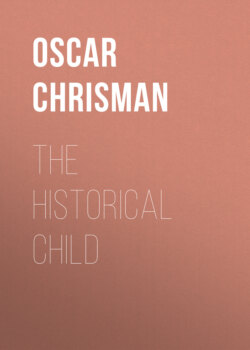Читать книгу The Historical Child - Oscar Chrisman - Страница 53
На сайте Литреса книга снята с продажи.
Boys and Girls.
ОглавлениеTable of Contents
"A son is the most coveted of all blessings that a Hindu craves, for it is by a son's birth in the family that the father is redeemed."64 This accounted for the difference in the feeling for a boy and for a girl. So strong was the desire for a son that sonless mothers were filled with great care and anxiety lest the child should not be a boy. There is, perhaps, nothing which will so weaken mankind as the life of the mothers before the birth of the children, so what a great influence upon the Hindu race must have been this constant worry of women who were to become mothers. Well might the wives worry, for according to Manu, a wife who had all daughters and no sons could be replaced with another wife in the eleventh year of marriage.
This was also a burden to a girl born into the family. If a boy died soon after the birth of a girl, or if a girl was born soon after her brother's death, she was considered to be the cause of such death and was accordingly treated very cruelly. This also had a bad influence upon the boys, as they soon learned to know of their superior being and learned to despise and to mistreat their sisters and later all womankind. After several sons had come into a family a daughter might not be undesirable and in some cases really wished for. Such a daughter was kindly and even affectionately treated.
The following is a striking passage. "Young children will obey their father, because they fear punishment if they do not; but they will overwhelm their mother with abuse, and will insult her grossly, even going so far at times as to strike her. When they grow older they fail to respect even their father, and it often happens that he is obliged to give way to his sons, who have made themselves masters of the house. Strange to say, nowhere are parents fonder of their children than they are in India; but this fondness usually degenerates into weakness. If the children are good, they are extravagantly praised; if they are naughty, their parents show the utmost ingenuity in finding excuses for them. The mild punishments that their naughtiness or disobedience brings down upon them invariably err on the side of leniency. The parents do not dare to whip them or scold them sharply, or even inflict any punishment that they would be likely to feel. The father and mother content themselves with making feeble remonstrances about their bad behavior, and if these produce no effect, they leave them to grow up in their evil ways. The few sensible parents who show more firmness and severity with their children are met with a show of temper. Sons do not hesitate to resist the parental authority and threaten to escape it by running away and living elsewhere. This threat rarely fails to produce the desired effect; the parents' severity melts away and they become passive witnesses of the disorderly conduct of their sons, who, encouraged by this first victory, end by becoming absolute masters of the house. One must, however, do them the justice to say that, after having thus gained the mastery over their parents, they take great care of them, as a general rule, and see that they want for nothing in their old age. But I fancy that in acting thus they are moved less by filial affection than by considerations of what the world will say."65
